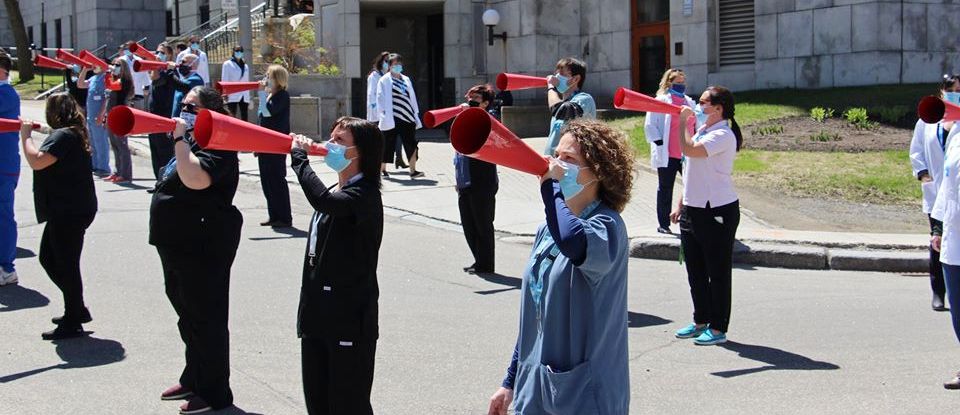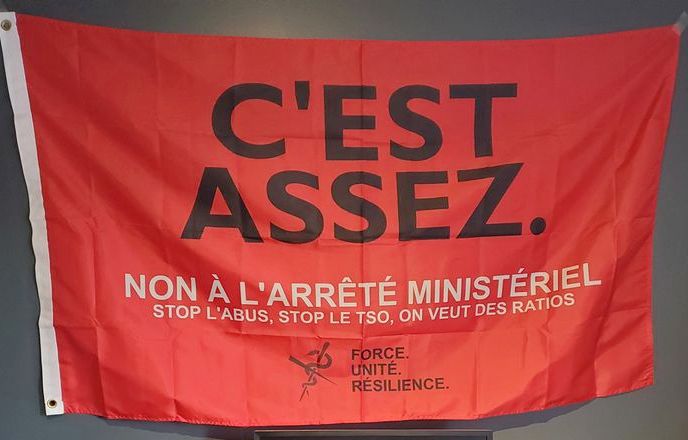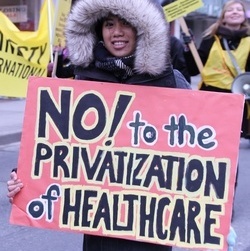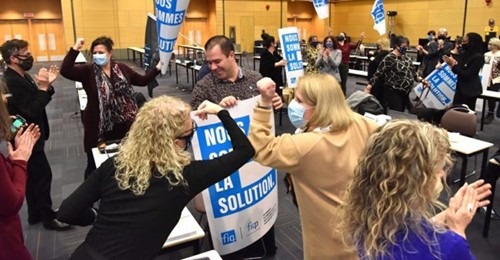|
December 10, 2020 -
No. 83
The
Crucial Fight to Curb the Pandemic
Workers
Continue to Speak Out

•
Sit-in at Saint-Hyacinthe
Long-Term
Care Centre Decries Staff Shortage and
Inadequate Personal
Protective Equipment
• The Issue of
Private Placement Agencies Must Be Addressed
- Interview,
Denis Cloutier
• "We Want
Reinforcements and Recognition for Our
Frontline Work for the Past Nine
Months"
- Interview, Julie Bouchard
• Interprofessional
Health Care Federation of Quebec Delegates
Endorse
Tentative Agreement
The
Crucial Fight to Curb the Pandemic

September
15, 2020. Nurses' rally at Quebec National
Assembly:
"We are the ones
keeping the system afloat." (FIQ)
In this
issue, Workers' Forum continues to
report on the
stands and actions taken by workers in the
crucial fight to contain the
COVID-19 pandemic, with examples from Quebec.
Governments in Canada
continue to implement plans to deal with the
pandemic that negate
workers' voices and refuse to implement the
solutions put
forward by frontline workers. Legislation in
Alberta and Ontario and
Ministerial Orders in Quebec show that one of
the main features of
government actions is the legalization of the
denial of workers' rights
so as to benefit the rich. The Kenney government
in Alberta keeps
piling one anti-labour law on top of another,
going so far as to
dismantle
post-war labour programs such as occupational
health and safety right
in the midst of the crisis. In the main, the
Ontario and Quebec
governments are resorting to ministerial orders
through which they give
themselves the power to cancel negotiated
agreements with workers and
change their working conditions at will, in
particular targeting health
care and social services workers. Other
governments are passing similar
legislation and emergency regulations.
In
the face
of the drastic increase of COVID-19 cases,
hospitalizations and deaths,
governments go back and forth, begging the
people to be "responsible,"
then threatening them with fines and other
police interventions if they
claim people are not. Blaming the people for
problems and issuing
threats show that a public authority that takes
any responsibility for
the people no longer exists as can be seen in
the damages governments
have done to health
care and social services, rendering the system
unable to face crises
such as the COVID-19 pandemic. Governments
refuse to mobilize workers
and all the people for collective action to
protect themselves and
society and overcome the pandemic. Their outlook
and practice of
muzzling the human productive force, which keeps
the country producing
and delivering the services during the crisis
and is protecting the
people, aggravates the crisis.
This huge pressure on the workers and
society is being met with firm resistance.
Workers are taking
initiatives, putting forward proposals and
demands and striving through
organized actions and media, including Workers'
Forum,
to create public opinion so that full safety
protection is provided to
all and solutions to the pandemic crisis are
worked out that benefit
the people.
At this time, families across the country are
discussing how to avoid mass gatherings during
the holiday season while
keeping close
links with all and looking after those who are
alone.
The
situation is difficult but not impossible.
Workers' efforts and
initiatives in defending their rights and the
rights of all, holding
governments and the narrow private interests
that are directly
controlling governance to account are developing
the fight to contain
COVID-19 and opening a path for a human-centred
economic and political
alternative.
The pages of Workers' Forum are
at the disposal of those involved in this
critical fight.

During the night of December 1, health care
workers scheduled
to work in one of the units at Quebec's largest
residential and
long-term care centre (CHSLD),
Hôtel-Dieu-de-Saint-Hyacinthe's
Residential Centre, refused to work because
their working conditions
were unsafe. Workers on the night shift in a
COVID-19 zone organized a
sit-in
when they found out that there were only three
nurses (including two
auxiliaries) for 64 patients.
Through their sit-in,
the workers also protested against infection
control measures which
they consider insufficient, including shabby and
undersized personal
protective equipment, such as gloves that do not
cover wrists, old
gowns full of holes and visors that break into
pieces, rendering the workers even more
vulnerable to contracting the
virus.
Brigitte Pétrie, on behalf of the
Montérégie-East Care Professionals Union,
denounced the situation at the CHSLD:
 "A sit-in is
always a sign that workers are fed up. It's
always a cry from the
heart. When it comes to this, it means that for
a long time now
employees have been pointing out that there's a
shortage of staff
during the night. That night, workers on the
evening shift [the shift
before the night shift] had been running around
without any time for
supper. Even the residents had not finished
supper until 8:00 pm because
the shift was so understaffed. Health care
professionals are worried
about their health, about transmitting COVID-19
to patients, about
taking it home to their families. On top of
that, we have outdated
equipment." "A sit-in is
always a sign that workers are fed up. It's
always a cry from the
heart. When it comes to this, it means that for
a long time now
employees have been pointing out that there's a
shortage of staff
during the night. That night, workers on the
evening shift [the shift
before the night shift] had been running around
without any time for
supper. Even the residents had not finished
supper until 8:00 pm because
the shift was so understaffed. Health care
professionals are worried
about their health, about transmitting COVID-19
to patients, about
taking it home to their families. On top of
that, we have outdated
equipment."
Management at the University Health and Social
Services Centre (CIUSSS) was dismissive in its
response to the
workers' sit-in and concerns. It wrote in an
email:
"The
nursing staff shortage is a provincial issue and
the situation is no
different in our institution. However, due to
recent developments on
site, we are currently reviewing the staffing
required for the
Hôtel-Dieu-de-Saint-Hyacinthe Residential
Centre's Parc unit."
Management also stated that it was unaware that
protective
equipment is of poor quality and outdated, a
response which workers
reject since they had complained about the
equipment several times in
the weeks before the sit-in.

- Interview, Denis Cloutier -

September
2020. "Health Care is Dying. We Are the
Solution" campaign of the
Interprofessional Health Care Federation of
Quebec (FIQ).
Denis Cloutier is
President of the Union of Health Care
Professionals for Montreal East
(FIQ SPS ESTIM).
Workers' Forum:
What are your main concerns at present in terms
of the situation within
the health care system?
Denis Cloutier:
We are very worried about what will happen in
January. I expect a new
increase in COVID-19 cases because of the
holiday season.
The more physical interaction there is between
people, the more the
virus is transmitted. The more outbreaks there
are, the more pressure
there is on the hospital sector. Some staff end
up contracting the virus, they have to take time
off work and then even
greater pressure is placed on those who remain,
with all the consequences that entails.
We're also in the
midst of negotiations with the Quebec government
for the renewal of our
collective agreement. One of the major problems
we have is with private
placement agencies. Historically, these agencies
hired nurses at a better wage than in the public
network, with the nurses playing a
filler role. They could work far away from
home or replace nurses on a short-staffed night
shift in exchange for
better pay. They were not employed by the
government, but by an agency.
Nurses within the public network had better
working conditions overall,
however they were paid less. As a result,
personnel employed by
agencies represented a small percentage of total
staff. There was a
certain balance within the overall network.
 When the pandemic
struck, the Legault government adopted
ministerial orders, including
Order 007 (March 21), which seriously affect us.
It alters collective
agreements and allows the employer to move staff
around at will, to
assign them day, evening, night shifts, or
full-time work. This
ministerial order only applies to public network
employees.
Agency work suddenly became very attractive
because the public network
employer, for example, is now able to force a
nurse who, over the years,
had gotten a good position in a local community
service centre (CLSC)
on the day shift, to work the night shift in a
residential and
long-term care centre (CHSLD), then hire a nurse
from an agency, paid
more, to work that day shift in the CLSC,
without having to work
weekends, nights, etc. There's no longer a
balance. When the pandemic
struck, the Legault government adopted
ministerial orders, including
Order 007 (March 21), which seriously affect us.
It alters collective
agreements and allows the employer to move staff
around at will, to
assign them day, evening, night shifts, or
full-time work. This
ministerial order only applies to public network
employees.
Agency work suddenly became very attractive
because the public network
employer, for example, is now able to force a
nurse who, over the years,
had gotten a good position in a local community
service centre (CLSC)
on the day shift, to work the night shift in a
residential and
long-term care centre (CHSLD), then hire a nurse
from an agency, paid
more, to work that day shift in the CLSC,
without having to work
weekends, nights, etc. There's no longer a
balance.
We
are losing a large number of the staff to
private placement agencies
who now offer not only better wages, but better
conditions. The workers
who leave the public network are coming back to
work as agency workers
and choosing their conditions. They can decide,
for example, not to
work in the summer, or not to work for two weeks
during the holidays. As for the pension plan,
although nurses who leave
have to withdraw from the Pension Plan for
Government and Public
Employees (RREGOP), the agencies have
increasingly grown and are
offering pension plans. I'm not saying they're
comparable to the
RREGOP, but nurses consider that with the
difference in wages they can
put money aside for their retirement.
This is going
to become a very serious problem for Quebec
because as far as our
University Health and Social Services Centre
(CIUSSS) is concerned,
during the first wave of COVID-19 we lost around
300 nurses to the
agencies and have lost around 500 in total so
far. There's a fear this
phenomenon will become even more pronounced
during
and after the holiday season. There's a strong
sense of injustice among
our members because nurses hired by the agencies
are working alongside
them without being required to do overtime, etc.
 This
inequity must be ended so that nurses can be
drawn back into the public
network. I'm not by any means blaming individual
nurses who choose to
go to work for an agency. However, this creates
unfairness and the
system would be much easier to manage if all
personnel worked for the
public network. There will always be
disadvantages in
the network as the system operates 24 hours a
day, seven days a week.
However, the best way is to spread the
disadvantages over as many
people as possible. This
inequity must be ended so that nurses can be
drawn back into the public
network. I'm not by any means blaming individual
nurses who choose to
go to work for an agency. However, this creates
unfairness and the
system would be much easier to manage if all
personnel worked for the
public network. There will always be
disadvantages in
the network as the system operates 24 hours a
day, seven days a week.
However, the best way is to spread the
disadvantages over as many
people as possible.
My other big concern is with
everything having to do with our negotiations
with the government. If
the Legault government were to sign a collective
agreement acceptable
to us, this would send a positive signal. It
would send a signal that
the staff is being listened to and valued. And
it would also help curb
the COVID-19 pandemic. Jobs would
be more valued, more people would decide to
stay.
WF:
Do you want to add something in conclusion?
DC:
The risk with Premier Legault's attitude is that
we don't look reality
in the face. Although our demands are important,
investments in the
health care system must also be increased. For
25 years now,
governments have all been following this
zero-deficit line that a
hospital should not spend more than a certain
amount of money, and so
on.
The buildings have gotten older and are in worse
shape, the number of
patients under each nurse's care has been
constantly increased, to the
point that it's becoming unsustainable. We need
to broaden the
discussion and increase investments in the
entire health care system.

- Interview, Julie Bouchard -
Julie Bouchard is President of the
Saguenay--Lac-Saint-Jean Care Professionals
Union, a member of the
Interprofessional Health Care Federation of
Quebec (FIQ). She
represents 3,200 health care professionals
including nurses, licensed
practical nurses, respiratory therapists,
nursing assistants,
respiratory therapists and clinical
perfusionists.
Workers'
Forum: What are the main problems
you are currently
facing?
Julie Bouchard: The
major problem at the moment as far as we are
concerned is the lack of
personnel. There is a shortage of nurses,
auxiliary nurses and
respiratory therapists. This is due, among other
things, to problems that predate
the pandemic and that have obviously increased
since the beginning of
the COVID-19 crisis.

"Nice
words are not enough any more. Your
'angels' are fighting and they
deserve better."
|
Before
the pandemic, there was already a fairly
significant shortage of health
care professionals. In the region, attracting
staff has always been
quite difficult. You have to understand that if
I go from Chicoutimi to
work in Dolbeau, which is part of our Integrated
Health and Social
Services Centre (CISSS), I have about a two-hour
drive. If I
go from Chicoutimi to Quebec City, which is
outside our region, it is
also about a two-hour drive. Between the two,
many people will favour
going to work in Quebec City because there is a
larger volume of care.
Within the region, we have our large centres
such as
Chicoutimi, Jonquière and Alma, as well as
smaller centres. If
workers do not come from the villages and towns
that are far from the
large regional centres, they generally prefer to
work in the large
centres outside the region or obtain positions
in the larger centres in
the region at the expense of
smaller centres where retention is even more
difficult. Services have
had to be reduced, or even shut down, in these
smaller centres due to a lack
of health care personnel, not a lack of doctors.
Secondly, since
we live in a region, the problem of progressing
(for example, moving
from part-time to full-time) makes retention
more difficult. It is more
difficult to keep our professionals who are
already in the network
because it is more difficult to us to advance in
our jobs and we are
not being heard. It seems that in the eyes of
the
Ministry of Health and Social Services or
certain CISSS leaders, we
should be self-sufficient with the amount of
staff we have while in
fact the management mode here is to operate on
the basis of mandatory
overtime. Mandatory overtime is imposed on us on
an almost daily basis.
 Faced with this
serious problem of recruitment and retention,
we say that we need to make the jobs in the
region more attractive so
that young people decide to come into the health
network and so that
the people currently in place stay here, don't
take early retirement
and don't change careers. Faced with this
serious problem of recruitment and retention,
we say that we need to make the jobs in the
region more attractive so
that young people decide to come into the health
network and so that
the people currently in place stay here, don't
take early retirement
and don't change careers.
WF:
Can you explain how, under the conditions of the
pandemic, the problems
have worsened?
JB:
The problems escalated fairly quickly because,
in order to protect
vulnerable workers, pregnant women and
immunosuppressed workers had to
be removed, resulting in the loss of about 100
health care
professionals. Even before the pandemic, the
rate of absenteeism here,
for physical or psychological reasons, was very
high
-- we are talking about a rate of about 12 to 14
per cent before the
pandemic.
Since the second wave, the entire
territory here has been affected with outbreaks
in hospitals,
residential and long-term care centres (CHSLDs)
and seniors'
residences. We have a very serious shortage of
health care personnel
because so many have contracted the virus.
We are
also facing the problem of ministerial orders.
There are three aspects
of these that affect us very much.
The first is the
forced increase in full-time availability.
Virtually all of the health
care professionals in Jonquière, Chicoutimi and
Alma have
been forced to be available for full-time work,
even if before they
were part-time.
The second is the requirement that
staff move from one institution to another to
cover the needs that are
the most critical.
The third is the imposition of
12-hour shifts. This imposition is accompanied
by the modification of
work schedules. For example, within a seven day
period the employer has
the right, under the Ministerial Order, to force
someone who is on a
day time schedule to work evenings, to change
his or her work schedule.
The imposition of 12-hour
shifts has caused great anger among members who
are already subject to
mandatory overtime more often than not. Now they
are being told that
they have to work 12-hour shifts. All of this
makes it very difficult
for staff to balance work and family, with
daycare and with school. For
some of them it's a major issue.
WF:
What are your demands under the current
conditions where outbreaks are
increasing significantly, including in your
region?
JB:
We are asking for reinforcements. We need help.
We are asking for
additional staff, for government support to send
staff to give us a
hand. We feel we are being forgotten. We have
the impression that we
are being told to "get ourselves organized "and
then things will be
fine.
There is an explosion of hospitalizations
related to COVID-19. The pressure is very high,
the overload of work is
enormous, the distress too. It's hard, every
day, to face the
consequences of how badly the health care system
has been battered over
the last many years.
We have received some
reinforcements, nurses from the Montreal Heart
Institute and
Sainte-Justine Hospital. That has provided some
relief but we need a
bus full of care professionals. What we have
asked for are third-year
graduates, nurses, nursing assistants or
respiratory therapists. We
want them to come in as reinforcements. There
are
discussions with the Ministry of Health and the
Ministry of Education
about that but it's very slow and they make it
so complicated.
We also ask for respect for the
workers as health care professionals, but that's
not what's happening.
We are being mistreated by ministerial orders
and the overload is even
heavier than it was before.
What we want is to be
able to provide safe, quality care to the
population. That's the
commitment we made when we graduated from
school. It is our number one
priority. Secondly, what we're asking for is
recognition. Government
should stop calling us their "guardian angels"
when they can't even
take care of us properly, even though we've
been on the front lines for nine months. We need
help.


At a virtual
meeting of the National Council on December 8,
delegates from the
Interprofessional Health Care Federation of
Quebec (FIQ) and of FIQ-Private Sector voted 82
per cent in favour of the tentative agreement
reached the same day with the government on
sectoral matters. Sectoral
matters pertain to working conditions. FIQ,
together with the Alliance of the Professional
and Technical Health and
Social Services Staff (APTS), is continuing its
negotiations at the
intersectoral bargaining table on wages, the
pension plan, parental
rights and regional disparities. When an
intersectoral agreement is
reached and then adopted by the FIQ and APTS
delegates, a comprehensive
tentative agreement setting out the entire
content of the new
collective agreement will be submitted to a vote
by all FIQ members.
The referendum will be held online.
A December 8 press release states that at the
heart of the demands of care professionals were
work overload, professional care/patient ratios,
particularly in residential and long-term care
centres (CHSLDs) and making full-time positions
more attractive.
 "These three
major issues are intimately linked with each
other and should be considered as inseparable by
the government. In the end, the gains we
obtained will guarantee health care
professionals that they will work with a
complete work team and in a stable position, on
both their centre of activities and shift. They
will be able to know their schedule in advance
and have time off. They won't be taken hostage
by mandatory overtime. In short, be able to
practice their profession in a health network
where work-family-personal life balance will
truly be possible," said Roberto Bomba and
Jérôme Rousseau, two of the leaders of the
negotiating committee. "These three
major issues are intimately linked with each
other and should be considered as inseparable by
the government. In the end, the gains we
obtained will guarantee health care
professionals that they will work with a
complete work team and in a stable position, on
both their centre of activities and shift. They
will be able to know their schedule in advance
and have time off. They won't be taken hostage
by mandatory overtime. In short, be able to
practice their profession in a health network
where work-family-personal life balance will
truly be possible," said Roberto Bomba and
Jérôme Rousseau, two of the leaders of the
negotiating committee.
FIQ's President, Nancy Bédard, assessed the
tentative agreement as follows:
"This is an agreement that will significantly
improve the Quebec nurses, licensed practical
nurses, respiratory therapists and clinical
perfusionists' working conditions. The gains
obtained are significant for the health care
professionals, as they will profoundly change
the destructive management culture of recent
years that has greatly contributed to the
deterioration of the working conditions.
Moreover, management by mobility and flexibility
will be a thing of the past and now the focus
will be on stability. Not only will our members'
quality of professional and personal life
improve, but Quebec patients will also have
greatly improved quality of their care."
Among the gains included in the tentative
agreement, FIQ notes:
- Targets for
reducing professional ratios in public and
private long-term care
facilities (CHSLDs) and the addition of 1,000
full-time equivalent
positions;
- A letter of agreement with the
objective of reducing the use of overtime and
the independent workforce (i.e., personnel hired
through private hiring agencies);
-
A commitment by the government to review the
directive on the
management framework governing the use of the
independent workforce;
- Voluntary upgrading of care professionals
from part-time to
full-time positions on their shifts and in their
activity centres;
- The addition of 500 full-time equivalent
positions with
priority in the medical-surgical activity
centres;
-
A new attraction-retention bonus for employees
holding a full-time
position on the evening, night and rotation
shifts that can increase by
up to four per cent;
- The weekend bonus for
full-time care professionals will increase from
four per cent to eight
per cent;
- The reduction of job insecurity for
care professionals, as they will have access to
part-time positions
seven days a week for every 15-day period;
- A
37.5-hour work week for clinical perfusionists,
respiratory therapists
who work in an activity centre 24/7 or on two
different continuous
shifts, as well as for nurses, nursing
assistants and respiratory
therapists who work in CLSCs and dispensaries.
"The necessary boost that the health network
and health care professionals so badly needed is
here at last. Obviously, this tentative
agreement on the sectoral matters will not
resolve all the health care professionals'
problems, but we are convinced that the effects
will be beneficial and sustainable over time for
our members, as well as for the patients in
Quebec," concluded Ms. Bédard.
FIQ
members have, along with other health workers,
stepped up their actions
in the last few months to reach out to the
public in order to increase
the pressure on the government to negotiate an
agreement that is
acceptable to them, therefore improving the
services to the
population. This pressure must not let up.
So long as governments
give themselves special powers to suspend
collective agreements
arbitrarily, the workers' security will continue
to lie in their fight
for the rights of all.

(To
access articles individually click on the black
headline.)
PDF
PREVIOUS
ISSUES | HOME
Website:
www.cpcml.ca
Email: office@cpcml.ca
|



 "A sit-in is
always a sign that workers are fed up. It's
always a cry from the
heart. When it comes to this, it means that for
a long time now
employees have been pointing out that there's a
shortage of staff
during the night. That night, workers on the
evening shift [the shift
before the night shift] had been running around
without any time for
supper. Even the residents had not finished
supper until 8:00 pm because
the shift was so understaffed. Health care
professionals are worried
about their health, about transmitting COVID-19
to patients, about
taking it home to their families. On top of
that, we have outdated
equipment."
"A sit-in is
always a sign that workers are fed up. It's
always a cry from the
heart. When it comes to this, it means that for
a long time now
employees have been pointing out that there's a
shortage of staff
during the night. That night, workers on the
evening shift [the shift
before the night shift] had been running around
without any time for
supper. Even the residents had not finished
supper until 8:00 pm because
the shift was so understaffed. Health care
professionals are worried
about their health, about transmitting COVID-19
to patients, about
taking it home to their families. On top of
that, we have outdated
equipment."
 When the pandemic
struck, the Legault government adopted
ministerial orders, including
Order 007 (March 21), which seriously affect us.
It alters collective
agreements and allows the employer to move staff
around at will, to
assign them day, evening, night shifts, or
full-time work. This
ministerial order only applies to public network
employees.
Agency work suddenly became very attractive
because the public network
employer, for example, is now able to force a
nurse who, over the years,
had gotten a good position in a local community
service centre (CLSC)
on the day shift, to work the night shift in a
residential and
long-term care centre (CHSLD), then hire a nurse
from an agency, paid
more, to work that day shift in the CLSC,
without having to work
weekends, nights, etc. There's no longer a
balance.
When the pandemic
struck, the Legault government adopted
ministerial orders, including
Order 007 (March 21), which seriously affect us.
It alters collective
agreements and allows the employer to move staff
around at will, to
assign them day, evening, night shifts, or
full-time work. This
ministerial order only applies to public network
employees.
Agency work suddenly became very attractive
because the public network
employer, for example, is now able to force a
nurse who, over the years,
had gotten a good position in a local community
service centre (CLSC)
on the day shift, to work the night shift in a
residential and
long-term care centre (CHSLD), then hire a nurse
from an agency, paid
more, to work that day shift in the CLSC,
without having to work
weekends, nights, etc. There's no longer a
balance. This
inequity must be ended so that nurses can be
drawn back into the public
network. I'm not by any means blaming individual
nurses who choose to
go to work for an agency. However, this creates
unfairness and the
system would be much easier to manage if all
personnel worked for the
public network. There will always be
disadvantages in
the network as the system operates 24 hours a
day, seven days a week.
However, the best way is to spread the
disadvantages over as many
people as possible.
This
inequity must be ended so that nurses can be
drawn back into the public
network. I'm not by any means blaming individual
nurses who choose to
go to work for an agency. However, this creates
unfairness and the
system would be much easier to manage if all
personnel worked for the
public network. There will always be
disadvantages in
the network as the system operates 24 hours a
day, seven days a week.
However, the best way is to spread the
disadvantages over as many
people as possible.
 Faced with this
serious problem of recruitment and retention,
we say that we need to make the jobs in the
region more attractive so
that young people decide to come into the health
network and so that
the people currently in place stay here, don't
take early retirement
and don't change careers.
Faced with this
serious problem of recruitment and retention,
we say that we need to make the jobs in the
region more attractive so
that young people decide to come into the health
network and so that
the people currently in place stay here, don't
take early retirement
and don't change careers.
 "These three
major issues are intimately linked with each
other and should be considered as inseparable by
the government. In the end, the gains we
obtained will guarantee health care
professionals that they will work with a
complete work team and in a stable position, on
both their centre of activities and shift. They
will be able to know their schedule in advance
and have time off. They won't be taken hostage
by mandatory overtime. In short, be able to
practice their profession in a health network
where work-family-personal life balance will
truly be possible," said Roberto Bomba and
Jérôme Rousseau, two of the leaders of the
negotiating committee.
"These three
major issues are intimately linked with each
other and should be considered as inseparable by
the government. In the end, the gains we
obtained will guarantee health care
professionals that they will work with a
complete work team and in a stable position, on
both their centre of activities and shift. They
will be able to know their schedule in advance
and have time off. They won't be taken hostage
by mandatory overtime. In short, be able to
practice their profession in a health network
where work-family-personal life balance will
truly be possible," said Roberto Bomba and
Jérôme Rousseau, two of the leaders of the
negotiating committee.